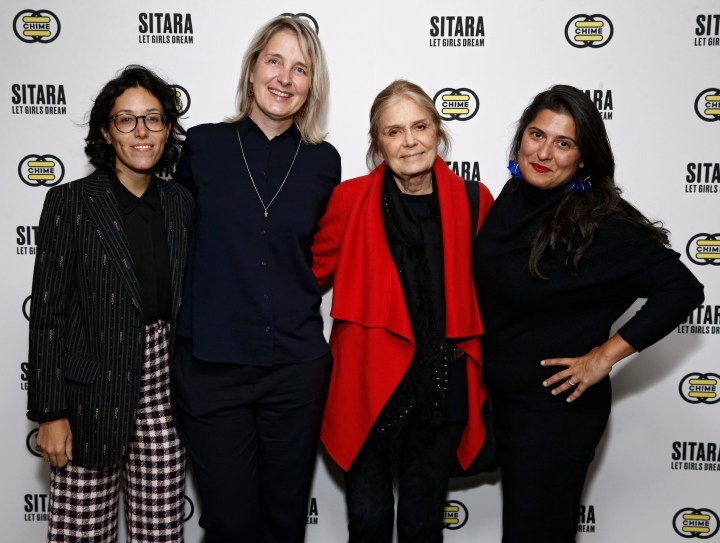Maverick Life
#LetGirlsDream: Child marriage is still a reality for 12 million girls around the world — including 91,000 in SA

In October, Gucci’s Chime for Change launched the Let Girls Dream campaign, with the release of two-time Academy and three-time Emmy Award-winning director Sharmeen Obaid Chinoy’s animated film ‘Sitara’.
As South Africa still bears the scars of the recent murder of Uyinene Mrwetyana and gender-based violence continues to dominate the news, it seems difficult to add the weight of forced marriage to the daily horrors of rights violations and violence on women and children.
Yet, last year, the Centre for Child Law in the Faculty of Law of the University of Pretoria, “expressed grave concern about the increasing incidence of child marriages in South Africa and the impact that this has on children and children’s rights”.
Girls Not Brides, a “global partnership of more than 1,300 civil society organisations from over 100 countries committed to ending child marriage and enabling girls to fulfil their potential”, noted that the traditional practice of ukuthwala, “the act of a man abducting a girl or young woman for the purposes of conducting a forced marriage”, which still happens in some rural parts of our country, might be one of the reasons driving forced unions of young girls.
Daily Maverick’s Bheki C Simelane had already observed in 2017, that “the latest numbers of children between the ages of 12 and 17 who are married, divorced, widowed, separated or living with a partner as husband and wife are shocking.
“Community survey results released by Stats SA indicate that more than 91,000 girls in South Africa between the ages of 12 and 17 fall in one of the above unions. KwaZulu-Natal is the province with the highest number of child brides, with 25,205, followed by Gauteng with 15,929 girls from a population of three million nationally; 122 girls between the ages of 12 and 17 have gone through divorce in KZN. The high number of child brides in KZN is no surprise. KZN is one of the leading provinces for forced marriages, known as ukuthwala, a custom which has received wide criticism.”
Forced marriages through ukuthwala were declared a criminal offence in 2016. South Africa also “committed to eliminate child, early and forced marriage by 2030 in line with target 5.3 of the Sustainable Development Goals, signed a joint statement at the 2014 Human Rights Council calling for a resolution on child marriage and… is one of 20 countries which has committed to ending child marriage by the end of 2020 under the Ministerial Commitment on comprehensive sexuality education and sexual and reproductive health services for adolescents and young people in Eastern and Southern Africa”, says Girls Not Brides; yet, change is slow and girls too young to give free and full consent to marriage are being sold off, their life and freedom wiped away like the tears of a sobbing child.
“Young girls everywhere still face considerable hurdles in achieving their dreams,” says director Sharmeen Obaid-Chinoy.
“Sitara embodies that struggle; it is the story of Pari, a young girl who dreams of becoming a pilot and is robbed of it. It is a story about the burdens of family and the impact of patriarchal culture. For me, Sitara is more than a film, it is a movement that we want to start across the world, that encourages parents to invest in their girls’ dreams, freeing their daughters from the burdens of early marriage.”
The film, which was created in collaboration with Vice Studios and Gucci’s Chime for Change initiative, and has US feminist, journalist, and social political activist Gloria Steinem as executive producer, is available for free to anyone wanting to organise a screening in their community. The idea is to spread the word as far and wide as possible, and in doing so, inspire conversations, change and action.
Along with the film, Chime for Change also released a Chime Zine titled To Gather Together, edited by community organiser and writer Adam Eli, and art-directed by Italian visual artist MP5. It features, among other contributions, the words of 23-year-old South African slam poet and co-founder of Vocal Revolutionaries, Lee Mokobe.
Mokobe, who four years ago delivered a powerful poem at a TED Talk in California about what it feels like to be transgender, wrote here about his queerness.
“Queerness is not the absence of normality / But the presence of spirituality. / There is no new place for me / In which I sacrifice my home for my gender. / My Africanness pushes me to flourish / And know myself before I speak. / I am neither man nor woman. / I am”. ML



















 Become an Insider
Become an Insider